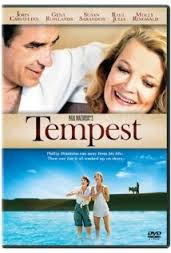
TEMPEST
US, 1982, 136 minutes, Colour.
John Cassavetes, Gena Rowlands, Susan Sarandon, Vittorio Gassman, Raul Julia, Molly Ringwald, Sam Robards.
Directed by Paul Mazursky.
Tempest was directed and co-written by Paul Mazursky. Mazursky has shown himself an interesting, if idiosyncratic, writer director - Bob and Carol and Ted and Alice, Blume in Love, Harry and Tonto, An Unmarried Woman, Moscow on the Hudson.
This is an adaptation of Shakespeare's play, playing on the names of the characters and the situations and trying to insert them into contemporary American society. The audience will be either intrigued by the straight-out plot-line or be trying to check the parallels between Mazursky's version and Shakespeare's. Cinematic effects are used to indicate magical powers, storms etc. (An interesting parallel would be Derek Jarman's 'punk' version of Shakespeare's play, The Tempest (1980)). The film stars John Cassavetes and his wife Gena Rowlands who work well together. There is a strong supporting cast with Raul Julia especially interesting as Kalibanos and Molly Ringwald as the young daughter. Photography was by Australian cinematographer Donald Mc Alpine.
1. The background of Shakespeare's play and its themes: age, wisdom, serenity? The older man as magician, escaping from society? His wonderful daughter and youthfulness? Fairies, goblins? Power and control? Shipwreck? Confrontation and reconciliation? Mazursky's use of the plot outline, adaptation, updating? Language and visuals? Comparisons of 17th. and 20th. century? Grandeur and modernity? Poetry, symbolism, magic? The value of the updating? The theatrical finale?
2. The impact of the visuals and music: New York, Greece, cities, islands, water, serene beauty, the storm? The effects of magic and the storm? The location photography, colour, contrasts? Flashbacks and the ending? The score and the range of songs, their insertion into the action, the final Manhattan theme? Editing?
3. The film in Paul Mazursky's filmology, a focus on characters, crises. relationships? The contribution of the stars?
4. 20th century interest in mid-life crises, the pressures of city life. the need for escape, nervous and marital breakdown, the search for self, into self? Rebellion and honesty? Pride and confrontations, forgiveness? The effect on the younger generation?
5. The psychological background of the film: the search for self and into self? Symbols: city, dreams and drowning, the dog, action, healing, women - wife, daughter (sexuality, celibacy)? An island location? Shadow themes? Storm and purging? Dance? Confrontation and unification?
6. New York life: traffic, Broadway, parties, party talk, relationships, apartments and the brittle life? Atlantic City and the world of gambling? Opting out - and the quality of the return? The playing of Manhattan (and the aerial photography?
7. Lifestyle: wealth, celebrity, the world of art, architecture, Atlantic City and the casinos, the building industry? The visuals of the buildings - to what purpose? The pressure of Alonzo and his henchmen? Freddie? Theatre and parties? Planes, the doctor, comic touches, accountants? Bewildering life, purposeless? The possibility of illness, death? The medical background and 20th. century concern about health?
8. John Cassavetes as Philip/Prospero - as a man, his age, arty, not listening, bond with Antonia, clash, his love for Miranda and seeing her as a 'kid'? Alonzo as boss? Death and his plummeting? Health, drinking? Relationships, kissing and dancing?
9. His decision to go to Greece: searching for his roots, the decision with Antonia, Miranda? The encounter with Aretha? Talk, infatuation? The key? Celibacy? The clash with Antonia, the cafe? The move to the island, the year? A new life, the presence of Aretha, celibacy? The encounter with Kalibanos? Violence? Miranda and the day? The amphitheatre? The dramatic importance of the film opening in Greece and moving to flashback from this point?
10. The day: talking with Aretha, the fighting and the drowning of Kalibanos, memories of Kalibanos? Miranda? The dog? Baseball and his arrogance? The wreck, his wrath, knowledge, tempest magic, urging the storm, purging and forgiveness?
11. Antonia: as woman, wife, type? Her marriage, love for Miranda? Her acting career, the party, her fear of hate, the fight, the liaison with Alonzo? Travelling with him? The scenes in Athens? The yacht and the breaking with him? The wreck and reconciliation? Forgiveness and union?
12. Miranda - child, outspoken, television, parties, the fights? Her relationship with her parents? Athens and approving Aretha? The island, yearning for TV, the innocent swimming, Kalibanos following her? The discussions with Aretha about sex? Gunsmoke? The encounter with Freddie, sexual awakening? The phone number? The ending?
13. Aretha and her story, in Athens, singing to tourists? Israel? Songs, pleasant? Love, sexuality, help, talk? Reconciliation? Helping Alonzo? Her future?
14. Alonzo as the entrepreneur, boss, Mafia-type connections, push, casinos, buying people? The doctor, the plane? The liaison with Antonia? Power, presence in Athens, the boat, the breaking with Antonia, the shipwreck? His relationship with Freddie and its effect on him?
15. Freddie and his relationship with his father, his story, infatuation with Miranda, lyrical sequences, reconciliation?
16. Harry and his being bossed around? The doctor and his style? Comic characters? Their being hangers-on, the experience of the shipwreck, on land, Kalibanos, the dancing?
17. Kalibanos and the background of Shakespeare's evil and comic character? His place on the island? Threats, television, infatuation with Miranda? The drowning and his memories? The cave? His song and dance to New York, New York? The tourists? Forgiveness?
18. The girl and Gurdjieff?
19. Philip's father and his influence on his son? Talk, age, greying, alone? Codes? mid-life crisis?
20. Themes of power and belief? Control, self-control? Love, celibacy? Themes of paradise - possible or not? Utopia? The storm and tempest theme with forgiveness and reconciliation?
21. Fantasy, reality, dream? Healing?